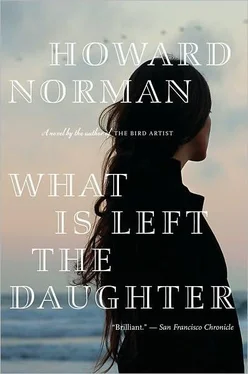"I don't find the platitudes in my book in the least dull," Tilda said. "Not a single one." With that, I was immediately alerted to two things. First, the fact that Tilda was not pleased. Second, maybe Hans had just fallen from grace a little. That was my hope, at least.
"Well, thank you, Hans. I've learned a lot," my aunt said. "We're in for supper now."
Remember my mentioning those éclairs? Well, back on the evening that Hans Mohring had arrived by bus, the three of us did meet up for éclairs. Cornelia sat in the corner, and I knew she'd noticed, though she didn't comment, that Hans held his fork, prongs curved downward, in his left hand and lifted pieces of éclair, neatly cut, to his mouth without transferring the fork to his right hand, which I learned was the European style. The next day, Tilda introduced Hans to Donald and Constance, but Tilda spirited him away quickly. "I'm going to tour Hans through Middle Economy," Tilda said. "All the sights there are to see. That'll be done in half an hour, then we'll sit at the wharf and reminisce about the tour for three or four hours. The thing itself; the memory of the thing, which gives it the longer life." I knew, with that last sentence, Tilda had quoted The Highland Book of Platitudes, though I don't know if Donald or Constance realized it. Off they went. A week later, Tilda announced, "I've invited Hans Mohring to supper."
"What's the hurry?" my aunt said.
"The invitation's made," Tilda said.
"Which evening?" my aunt asked.
"Tomorrow evening."
"I'll get out my recipes."
"It'll be nice for Hans," Tilda said. "He's only been eating Cornelia's sandwiches."
"I hope he's shared them with you," my aunt said.
"Is that your way of saying you haven't seen me for supper lately?"
The next evening at about six-thirty, Aunt Constance had the table set with her best china and Christmas cloth napkins. No tablecloth, but she had polished the wood. Hans was seated next to Tilda. I occupied the one chair opposite them, my place setting noticeably centered alone on that side of the table. Of course, my aunt and uncle sat at either end. My aunt served baked salmon, boiled potatoes, bread and — rare at our table — white wine, and there was a pitcher of water, too. She said a prayer. Hans dug right in, wielding his fork in that different fashion. "Well, won't you look at that!" my aunt said, and we all turned to the dining room window. Half a dozen children had their faces pressed to the glass.
"Cornelia Tell must've said something to somebody," Tilda said.
"You're giving those kids quite the lesson in German etiquette," my uncle said, moving his fork from his right to left hand, spearing a piece of salmon and eating it. Hans caught on directly.
"After dinner, perhaps I'll sit on the porch and tell them a Grimm's tale," Hans said.
"How grim?" my aunt asked. "They're our neighbors' children, after all."
"No, no," Hans said. "The Brothers Grimm. They are famous German storytellers. Long dead now — very important. You know 'Hansel and Gretel'?"
"I read it to Tilda when she was a little girl," my aunt said.
"Originally, that's a story told by the Brothers Grimm," Hans said.
"Those Grimms brothers," my uncle said, "did they tell any truly heart-stopping tales? If you know one of those, Hans, go right ahead and scare hell out of those little rabble-rousers out there. Maybe toss in a few German words to boot."
"You don't mean to tell me Hansel and Gretel were German children," my aunt said.
"Also 'Rapunzel' and 'Rumpelstiltskin'—both of them," Hans said.
"Not 'Rumpelstiltskin'!" my aunt said.
"I'm afraid so," Hans said.
"Well, live and learn."
Tilda wore a dress of her own design and her own making. It was ankle length, made of cotton material so dark a blue it was almost black. I'd seen her sewing it, but I'd never seen her wearing it. Hans Mohring coming to dinner apparently was the occasion she was waiting for. The dress had a high collar, and Tilda had pinned an ivory cameo to it. So, what with Hans wearing his same white shirt buttoned to the neck, they reminded me of a portrait of a stuffy Victorian British couple that used to hang above the card catalogue in Mrs. Oleander's library. I now realize my making that connection of Hans and Tilda with the portrait meant I had a sudden concern about them becoming an old married couple. Who knows? Maybe they'd become well-to-do, maybe they'd end up living in England. I didn't like the thought, but you can't help where your mind goes, can you?
Supper was pleasant enough, all "Please pass the bread" and "What is life like at university, Hans?" But I could see that Hans thought Tilda was the cat's pajamas — also, they'd been seen together in public, at Cornelia's bakery, Parrsboro Wharf, walking hand in hand along the horseshoe-shaped beach. Apparently Cornelia had even called them "lovebirds." And when Reverend Witt suggested Tilda bring Hans as a guest to church, according to Witt she said, "I have a different rendezvous in mind this Sunday." I knew they spent hours on end in the library, actually more hours than were officially posted as OPEN, because Mrs. Oleander had given Tilda a key. Separate arrangement, just so Tilda and Hans could discuss God knows which words, plus have privileged access to the big Webster's dictionary.
At supper, no subject caused a dustup, but then again, my uncle hadn't referred to U-boats or the war in general, and Hans didn't lecture us on philology. He took seconds on the potatoes, so did I, so did my uncle. There were two or three awkward silences. However, none felt like an outside presence had hushed all human voices. Because had such a silence occurred, my aunt predictably would have said, "An angel is passing." All well and good. Yet when Tilda stole, in plain sight, a spoonful of Hans's dessert of vanilla ice cream (he'd refused the maple syrup), the playfulness of it made me blurt out, "Hans, why would a person in their right mind get hypnotized nine times, anyway?"
Tilda corkscrewed her ears. Not only was I reckless in referring to the reason Reverend Witt had suggested that Tilda visit a mesmerist — that was a sore subject in our house — but, in the same breath, I'd more or less suggested that Hans, too, wasn't right in the head.
"Hans, my family — including Wyatt here — doesn't have much experience with hypnotism," Tilda said. "Wyatt didn't mean anything by it."
"Yes, but for the sake of argument," Hans said, "let us say that Wyatt honestly did mean something. I can educate him—"
"I fell short of graduating high school by only a year," I said.
" —educate in the sense of why I needed hypnotism so many times," Hans said.
"Why not educate all of us, then?" my uncle said.
"But why not educate us in the parlor?" my aunt said. "Tilda, dear, please clear the dishes. Wyatt, fetch my gray sweater from its peg. I'm feeling the evening air." Once we were situated — Tilda in the rocking chair, Donald and Hans on ladder-back chairs brought from the kitchen, me on the sofa — Donald said, "Full speed ahead, Hans. Give us your reason for those nine hypnotisms."
My aunt carried in a tray and distributed tea and cookies all around, then sat next to me. Hans took a bite of cookie, leaned forward and said, "You see, I walked in my sleep. I was most prolific at this, you might say. It started at age ten. We lived in a small village. Larger than yours, yes, but not large by standards of German farm villages. It wasn't far from Munich. We had a small house. My parents are good people, you see. And they had, with me, I think you say, a handful. They had a handful. At night, I was walking long distances in my sleep. Usually I was found out on the road. Once I was about to swim in a pond. A number of times I was found in a neighbor's garden."
Читать дальше












